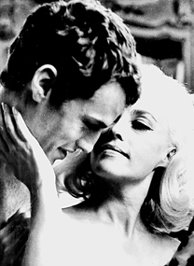Jacques Demy, La Baie des Anges
| Available on Amazon: Jacques Demy, La Baie des Anges [Bay of Angels], Jeanne Moreau, Claude Mann (1963, U.S. DVD release on December 9, 2003) |
 |
Jacques Demy, Lola (March 4, 2006) L'univers de Jacques Demy (January 17, 2006) Peau d'âne (December 27, 2005) Michel Legrand Interview (August 26, 2005) La Deneuve in Cannes (May 13, 2005) Le Jazz in Saint-Germain (May 8, 2005) Agnès Varda, Jacquot de Nantes (February 19, 2005) |
In L'univers de Jacques Demy, Agnès Varda claims that her husband got interested in gambling when they went to Cannes -- her film Cléo de 5 à 7 (1961) was up for an award. He went into the casino, never having seen a roulette table in his life. He bet once on the number 17 and won big. In the movie Jackie and Jean play only roulette, and 17 is Jackie's "lucky number." Never mind that she loses more money on 17 than what she wins. Precisely because the movie is not like the movies that Jacques Demy is known for, it is the favorite movie of the director's son, Mathieu. Varda gave a fair amount of time in her film to Jeanne Moreau -- still blonde, still smoking -- who spoke of her memories of Demy's methods. He controlled everything: what the actors wore, exactly what they said (he insisted on fidelity to his screenplay) and how they said it.
I certainly enjoyed watching this movie, but I am not sure if I will want to watch it again anytime soon. As with Lola, the ending is abrupt and, although perhaps slightly ambiguous, it rang false. Still, definitely recommended for its visual beauty.




















































No comments:
Post a Comment